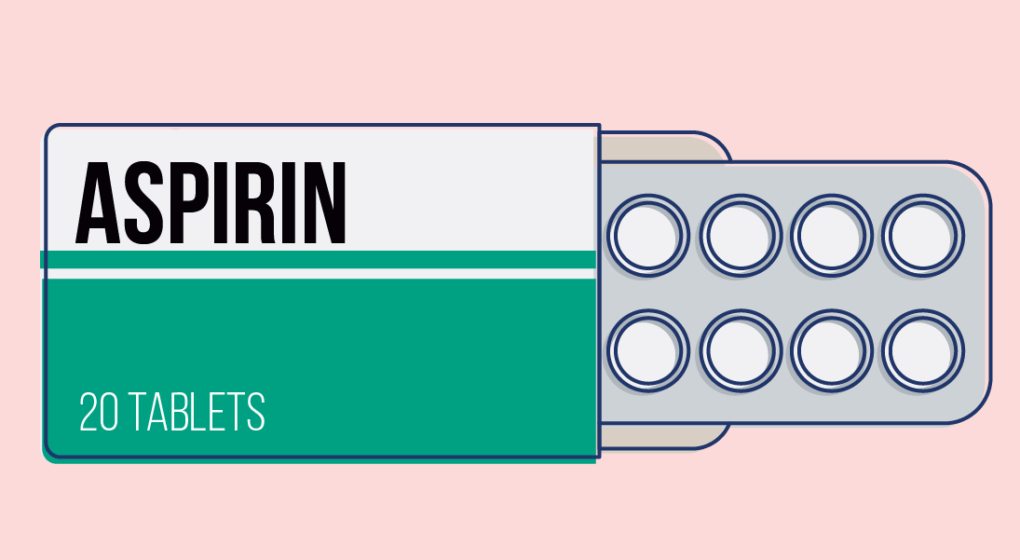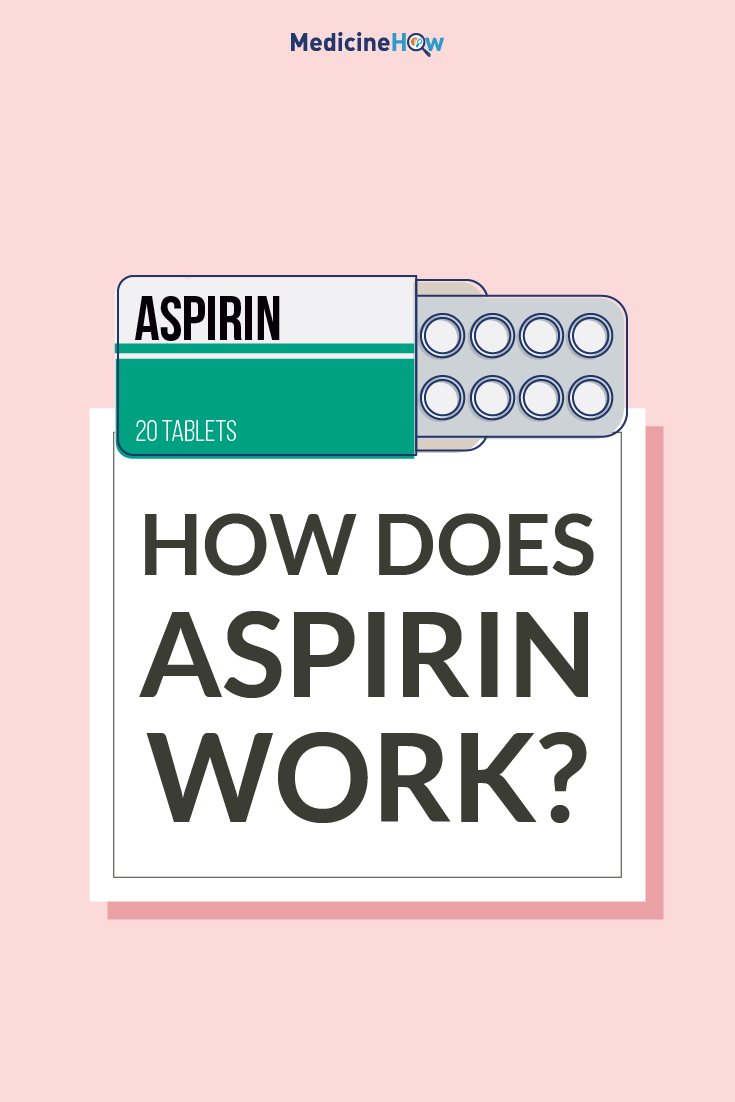
Aspirin, also known as acetylsalicylic acid, works in a number of different ways in the body to relieve pain, reduce fever, reduce inflammation and change the way your blood forms clots to prevent cardiovascular complication.
It prevents the production of pain messengers called prostaglandins in the body by inhibiting COX1 and Cox2, which are needed to produce prostaglandins. It also inhibits the aggregation of platelets to “thin” the blood, which can help to prevent the formation and reduce the risk of blood clots, which can cause cardiovascular events such as a heart attack or stroke.
There are many possible reasons that you may need to take aspirin. Let’s take a look at how aspirin works, why it might be able to help you, and what you should be aware of.
Brand Names and Doses
![]() Aspirin, or acetylsalicylic acid, is the generic name, which is the name of the actual drug inside each pill. The brand name on the packaging of your medication might be slightly different, but they all contain the same drug – aspirin – and work in the same way in your body to do the same thing. Some brand names include:
Aspirin, or acetylsalicylic acid, is the generic name, which is the name of the actual drug inside each pill. The brand name on the packaging of your medication might be slightly different, but they all contain the same drug – aspirin – and work in the same way in your body to do the same thing. Some brand names include:
- Aspro
- Disprin
- Solprin
- Astrix
- Cardiprin
- Aspro Protect
- Cartia
There is an oral tablet or dispersible tablet to be dissolved in water and drunk of aspirin available. Most brand names come in both types of formulations.
The recommended dose depends on the purpose that it is used for. The dose needed to provide pain relief is higher than the dose needed to change the platelet aggregation of the blood. The standard dose for pain relief or to reduce fever is 1-3 tablets (300 mg of aspirin in each tablet) is higher than the daily dose to prevent blood clotting and cardiovascular events, which is usually one 75mg or 100 mg tablet each day.
Drug Combinations
![]() Aspirin is also available in combination with other medications because they are commonly used together. This simply makes it easier for you to remember to take them both each day – it’s like taking two pills at once in one.
Aspirin is also available in combination with other medications because they are commonly used together. This simply makes it easier for you to remember to take them both each day – it’s like taking two pills at once in one.
For example, aspirin is available in a combination product with another drug called dipyridamole, under the brand name Asasantin. Dipyridamole is another anti-platelet drug that affects the ability of the blood to form clots. They are often used together after you have had a stroke or other cardiovascular event.
A combination product of aspirin with pravastatin is also available and is usually used if you have had a heart attack of you have unstable angina. Pravastatin is a medication that helps to control the levels of cholesterol in your blood by blocking the production of cholesterol.
What is it used for?
![]() Aspirin has a broad range of actions on the body and, as a result, it can be used for many different purposes. Most commonly, it is used to relieve pain or to prevent cardiovascular events.
Aspirin has a broad range of actions on the body and, as a result, it can be used for many different purposes. Most commonly, it is used to relieve pain or to prevent cardiovascular events.
Here are few of the common reasons that you may have been prescribed it:
- Pain Relief
- Anti-inflammatory
- Reduce fever
- After a heart attack
- Unstable angina
- Prevention of stroke (if you are at risk)
- Prevention of heart attack (if you are at risk)
- Prevention of ischaemic heart disease (if you are at risk)
How does aspirin work?
![]() Aspirin has a range of effects on the body, which is one of the reasons that it is used for so many different purposes. There are two main mechanisms of action for aspirin that we care going to have a look at because they are quite distinct from each other: for pain and the blood.
Aspirin has a range of effects on the body, which is one of the reasons that it is used for so many different purposes. There are two main mechanisms of action for aspirin that we care going to have a look at because they are quite distinct from each other: for pain and the blood.
For Pain and Inflammation:
When you feel pain, it is because your brain nerves bring the message of pain (and other sensations) from around the body. There is a certain enzyme called cyclo-oxygenase (COX) that is responsible for producing prostaglandins in areas of pain, which signal the message of pain to the brain and cause the area to become inflamed so that it can heal better.
Aspirin blocks two different types of this enzyme, COX-1 and COX-2, so that they can’t produce as many prostaglandins as usual. As a result, it both reduces the pain and works as an anti-inflammatory.
For the Blood:
Platelets are tiny particles in the blood that help to prevent you losing too much blood when a blood vessel is cut by forming a clot. They are sort of “sticky” and can stick together to create a plug – the clot – to stop the flow of blood. The platelets can also sometimes stick to atherosclerotic plaques in the blood vessels, causing a clot to form inside the blood vessels and lead to a heart attack or stroke.
Aspirin helps to prevent this by reducing the “stickiness” of the platelets. If they are no longer able to stick together to form a plug or a clot as well, you will be less likely to experience a cardiovascular event.
Side Effects
![]() Aspirin is quite safe, and most people can take it without experiencing significant side effects. However, there are a few side effects that you may notice when taking aspirin.
Aspirin is quite safe, and most people can take it without experiencing significant side effects. However, there are a few side effects that you may notice when taking aspirin.
Because of the way it works to “thin” the blood and reduce the likelihood of the blood to form clots, a side effect that makes sense is increased bleeding time. If you get a cut on your finger, it might take long to form a clot and stop the bleeding – this is expected because of the way aspirin works. This is why you should stop taking aspirin a week before having any surgery so that the area can stop bleeding and begin healing more easily after the procedure.
Other side effects of aspirin may include:
- Nausea
- Heartburn
- Vomiting
- Headache
- Dizziness
Caution: Not for Use by Children
![]() There are some people who should not take aspirin because it can do them more harm than good. Aspirin may not be the best choice for:
There are some people who should not take aspirin because it can do them more harm than good. Aspirin may not be the best choice for:
- Children under the age of 12
- Adolescents who are have recently had chicken pox, influenza or fever
- Pregnant women
- Breastfeeding women
- Asthmatics
- People with upcoming surgery
Aspirin is not recommended to be used by children because it is linked to causing Reye’s syndrome. (90% of cases of Reye’s syndrome is linked to the use of aspirin in children (1))
Interactions
![]() Aspirin can interact with several other medications that you may be taking, including;
Aspirin can interact with several other medications that you may be taking, including;
- ACE inhibitors: aspirin can reduce the effect of ACE inhibitors and increase the risk of renal impairment, particularly in older people.
- Acetazolamide: with aspirin doses for pain relief, there is an increased risk of side effect of acetazolamide, such as metabolic acidosis
- Aldosterone antagonists: aspirin can increase the risk of high potassium levels in the body, particularly in older people.
- Alendronate: when used together, there is an increased risk of gastric ulceration.
- Amiloride: aspirin in doses for relieving pain can increase the risk of high potassium levels in the body, particularly in older people.
- Anagrelide: when used together, there is an increased risk of bleeding.
- Corticosteroids: when used together, there may be a reduction in the concentration of salicylate in the body
- NSAIDs: when used together, there is an increased risk of gastric ulcers and bleeding.
- Probenecid: aspirin at doses for pain relief and reduce the effect of probenecid.
- Valproate: aspirin can increase the concentration, effect and side effects of valproate.
- Warfarin: when used together, there is an increased risk of bleeding.
It can sometimes be okay to take two drugs that interact if your doctor is aware of the interaction and monitors for complications. If you are worried, simply have a chat with your doctor to talk more about the drugs you are taking.
Pregnancy and Breastfeeding
![]() Aspirin at the doses used for pain relief is not usually recommended for women who are pregnant or breastfeeding. The lower doses of aspirin used for antiplatelet action to thin the blood are sometimes used throughout pregnancy, depending on the specific situation.
Aspirin at the doses used for pain relief is not usually recommended for women who are pregnant or breastfeeding. The lower doses of aspirin used for antiplatelet action to thin the blood are sometimes used throughout pregnancy, depending on the specific situation.
For pregnant women, there is a possible increased risk of miscarriage for women who take aspirin or other NSAID medications. This is because of the way that aspirin inhibits the synthesis of prostaglandins
Pin it!


